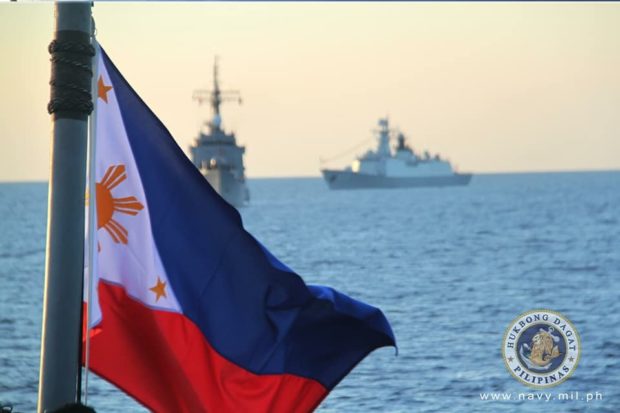
Photo from PHILIPPINE NAVY
The navies of Asean nations and China will launch their first-ever maritime drills later this month amid ongoing maritime disputes in the South China Sea.
The Philippines will join the exercises hosted by China in Zhanjiang from Oct. 22 to 29, Defense spokesperson Dir. Arsenio Andolong told reporters Monday.
It is still undetermined which vessel the Philippine Navy would be sending for the exercises.
“At the moment, the only thing certain are the dates which is Oct. 22 to 29 and the Philippines is participating,” he said, adding that Navy chief Vice Adm. Robert Empedrad is likely to attend the exercise.
Asean and China navies conducted tabletop exercises in Singapore last August but the actual drills would only take place this October.
Andolong said that defense ministers earlier agreed that the drills, which was originally proposed by China, would not take place in contested areas. Hence, it was decided to be held in Zhanjiang, located in the southwestern end of Guangdong province.
The drills would focus on cooperation and responding to maritime incidents at sea.
“We hope to deepen our understanding [with them] and we are also exploring the possibilities of finding ways to improve the unexpected encounters and sea protocols,” Andolong said.
China continues to assert its “indisputable sovereignty” over almost the entire South China Sea despite its massive claims being invalidated by an international arbitration court in The Hague in 2016, in a case filed by the Philippines.
Malaysia, Vietnam, Brunei are the other Asean member states which have claims in the South China Sea, aside from the Philippines, China and Taiwan.
Non-claimant Asean states include Cambodia, Indonesia, Laos, Myanmar, Singapore and Thailand.
A defense analyst told Inquirer.net early this year that the Asean drills with China was “tantamount to rewarding Beijing for its bad behavior.”
“The Chinese military will also use these exercises to establish direct contacts with their military not for confidence-building measures but more on networking to co-opt and influence Asean militaries, with the Philippine military fast turning into the most vulnerable one for cooptation due to the pro Beijing policy of Duterte and the willingness of some within the Philippine military institution to advance their careers by advancing pro-China policies within the services,” Jose Custodio said in June.
He added that confidence-building measures have been “abused” by China since the 1990s when it lied about its presence in Panganiban Reef (Mischief Reef) by saying that they only built fishermen shelters.
International maritime security expert Collin Koh said that the drills would be confidence-building measures at best but would not actually help in the ongoing sea disputes.
“Even where it concerns confidence-building, I also have reservations about the impact it has on actually moderating behavior of the claimants, not least China. If I can just be blunt: even if this exercise takes place and becomes a regular event, the claimants will still most plausibly continue with their respective activities to maintain and even enhance their possessions in the disputed waters, including militarization,” he said. /je
RELATED STORY
Hope, skepticism over first-ever Asean-China maritime drills this year

